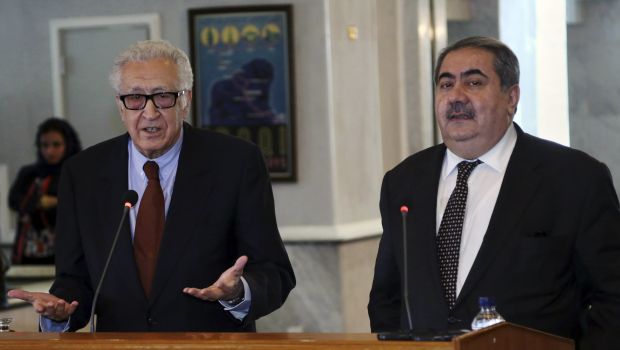
UN envoy to Syria, Lakhdar Brahimi, and Iraqi Foreign Minister Hoshyar Zebari attend a joint news conference in Baghdad on October 21, 2013. (REUTERS/Khalid Mohammed/Pool)
Brahimi has been visiting regional capitals in order to bolster support for a peace conference on Syria’s ongoing civil war, scheduled to take place in Geneva in November.
A statement issued by Maliki’s office, after hosting Brahimi in Baghdad, said: “Iraq is certainly ready to commit to the efforts of the global envoy and support them in order to fulfil a political solution, which reassures all Syrians and the region.”
The statement said that Brahimi has spoken to Maliki and “called for concerted efforts to reach a political solution to the Syrian crisis,” specifically “an agreement following the Geneva II conference at the end of next month.”
At a press conference held in Iraq on Monday, Brahimi called for Iraq to back efforts at securing a diplomatic solution to the conflict. He encouraged all sides, including the Syrian government, to offer concessions aimed at securing a political settlement, which he argued was in the interests of all sides in the conflict.
At the same conference, Iraq’s foreign minister, Hoshyar Zebari, announced that “Lakhdar Brahimi is touring Arab and other regional states to consult and search for developments in their status towards Syria and the ongoing Syrian crisis—the repercussions of which are directly affecting regional and neighboring states.”
“There is an intense international effort driven by the United Nations, the US and Russia to put forward an agreement for the Geneva II peace conference. Naturally, discussions are heading in this direction,” added Zebari. “Everyone is convinced that a political solution to the Syrian crisis is the viable option.”
In response, Brahimi said that “we have consulted with the government of Iraq with regards to this extremely grave tragedy, the tragedy of the Syrian people. There is a consensus, among those with interests in the region, that the Syrian crisis is the most serious of all current events and it threatens global peace.”
“The conference [Geneva II] is to build on what was agreed in the first Geneva conference and we are trying, by holding this conference and with the attendance of the Syrians, to enforce what was agreed upon over a year and a half ago,” added Brahimi.
In a statement to Asharq Al-Awsat to Ali Al-Mussawi, media advisor to the prime minister, said that “Iraq’s vision is to find a political solution for the Syrian crisis through the formation of an interim government, which is agreed upon. This government should then initiate the process of national elections, [which are] transparent and under international and Arab observation, to allow the Syrian people to express the change they want.”
“This was Iraq’s vision from the beginning, however, it did not receive the required support and there was a general tendency to try to resolving the conflict militarily. This is the matter that Iraq contested honestly—secretly and openly—and it endured violent attacks because of it…After all of this, and other things, it seems that the world is now geared towards, more than ever before, to produce a political solution—not a security-based or military one.”
However, while Brahimi is set to continue his regional tour in preparation for the Geneva II conference, it remains unclear if representatives of the Syrian opposition will attend.
A conference of foreign ministers from the ‘Friends of Syria’ group of 11 states—which includes the US, UK, France, Turkey and several leading members of the Arab League—began on Tuesday in the hopes of persuading Syria’s fractured opposition movement to put their differences aside and agree to participate in the conference.
Diplomatic sources told Asharq Al-Awsat that Ahmed Al-Jarba, the chairman of the main opposition umbrella group, the Syrian National Coalition, will attend the London talks.
